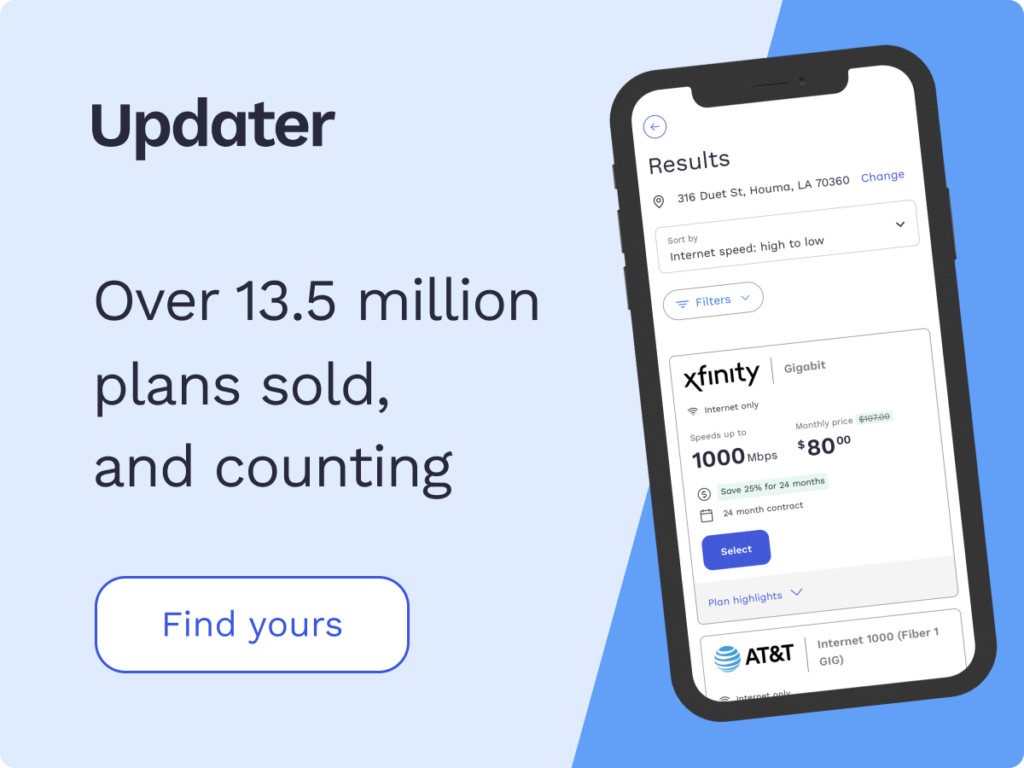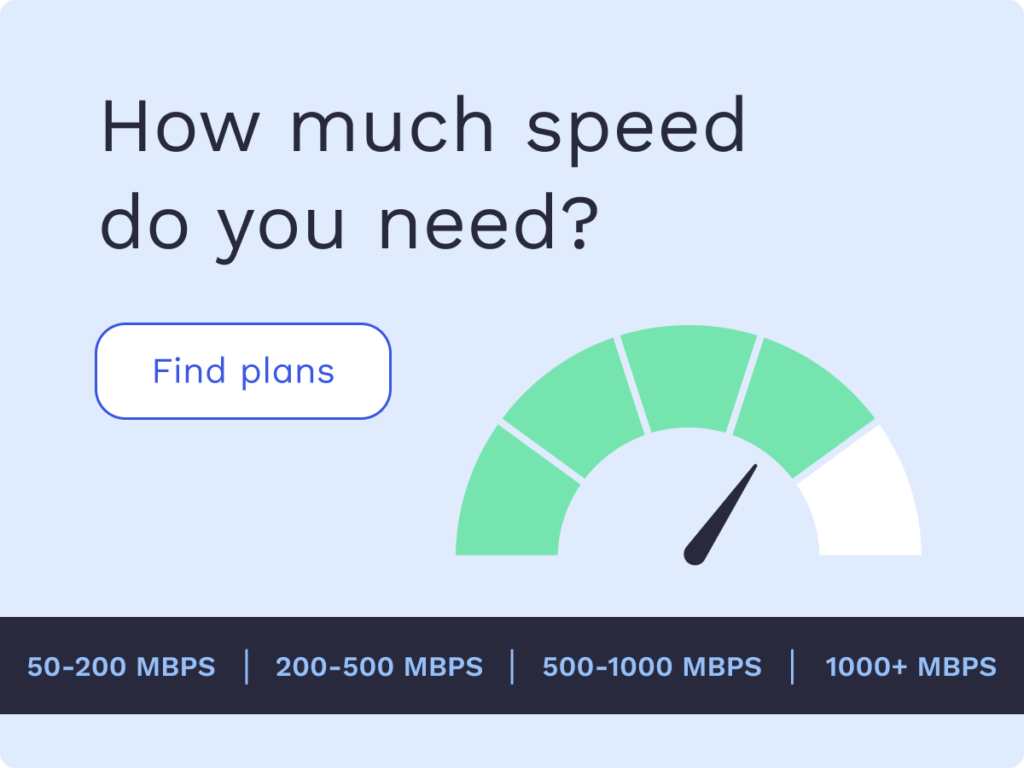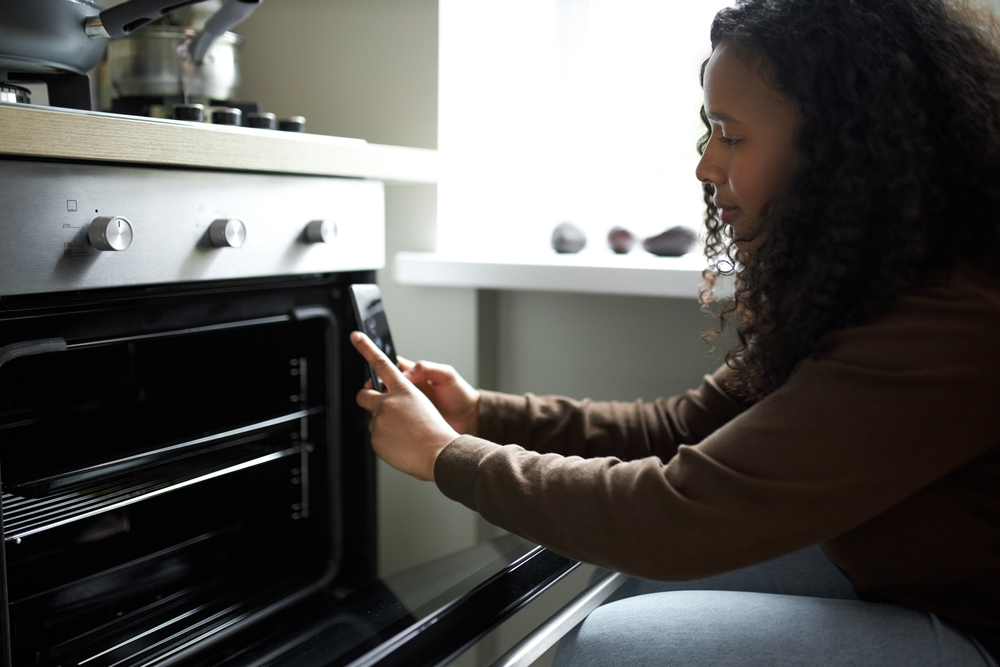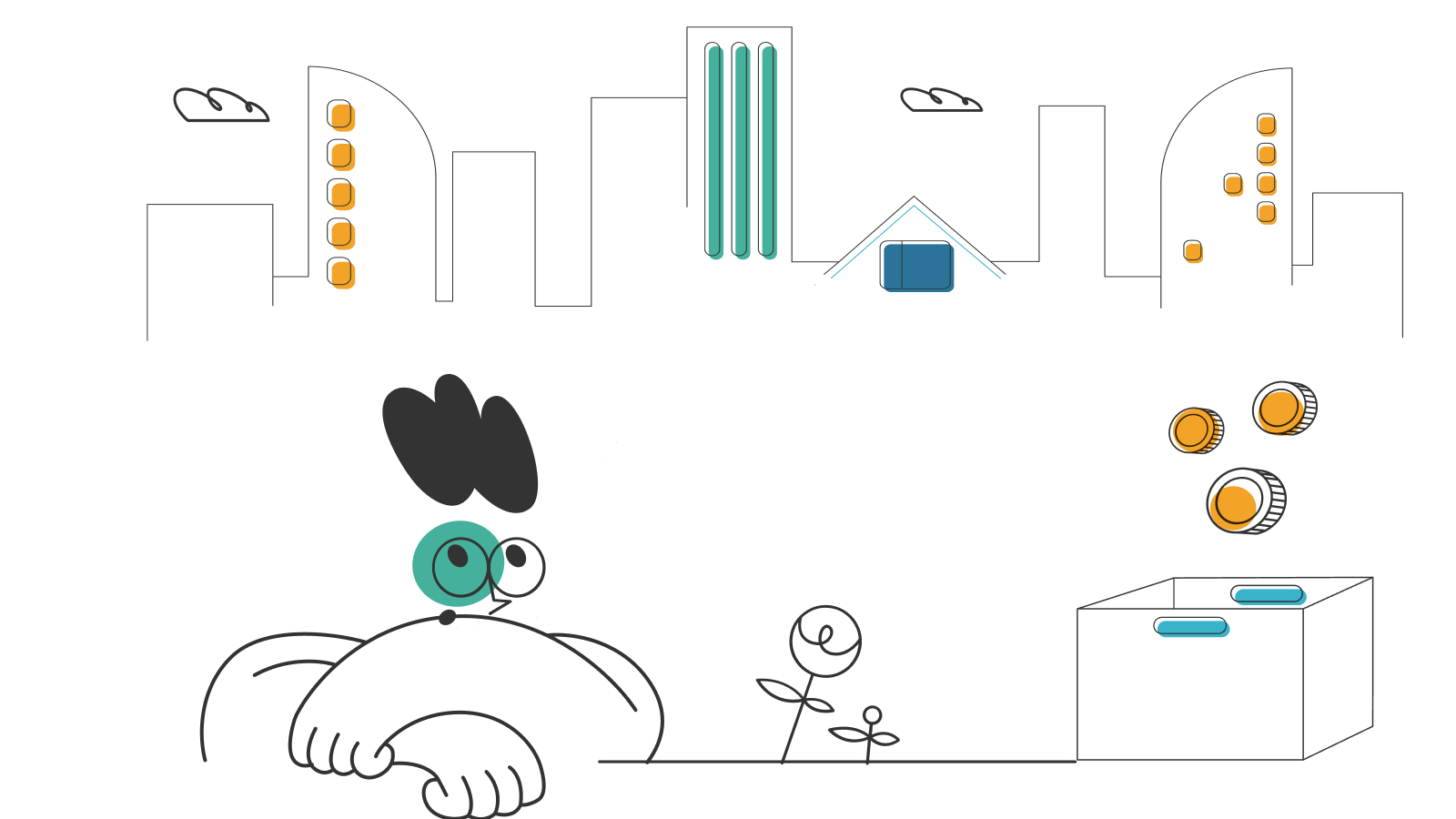How Much Speed Do You Need for Streaming?

Do you stream your favorite TV shows, movies, music, or video games? If not, you might be in the minority these days. With the widespread availability of faster internet speeds, more people stream the content they watch, listen to, and play these days than do not.
Streaming puts the power to choose entertainment on your terms instead of relying on a cable TV service or renting a movie or game. However, to stream content effectively to the devices you have in your home, one key factor must be assessed: your internet speed. This guide provides a closer look at how bandwidth and speed matter when streaming content, what rates you may need for streaming through different platforms, and more valuable insight into streaming.
- What is streaming?
- Internet speeds needed for streaming
- Factors that affect internet speed
- Best internet providers for streaming
- Streaming FAQs
What is streaming?
In the most basic terms, “streaming” describes using the internet to watch, listen to, or play content on devices. While people once relied on cable and satellite to watch their favorite TV shows, movies, and content, streaming makes it possible to access a broad collection of content on-demand. And, content is not limited to video—internet users can also stream music, games, and live content feeds through some platforms.
What you need for streaming
To stream content, you need an internet-connected device, such as a TV, smartphone, or tablet, and access to a streaming platform or app. For example, if you want to stream movies, you need a TV that connects to the internet and a streaming platform like Netflix, Hulu, YouTube, or Disney Plus.
In general, streaming will require a certain level of bandwidth from your internet connection and a certain speed to support the quality of the content. Certain activities, like listening to music without video or watching standard-definition (SD) video require less bandwidth and speed than something like streaming games or watching a high-resolution video in 4K quality.
What is bandwidth, and what about Mbps?
In terms of the internet, bandwidth refers to the rate at which data is transferred. The abbreviation Mbps (megabits per second) is used in reference to the actual rate at which the data is transferred. Internet speeds are often displayed by internet service providers (ISPs) in terms of upload and download speeds. Download speeds are significant when streaming, but upload speeds can be critical when data is being sent, such as with gaming.
Why speed matters when streaming
When you are streaming content, the speed at which data is sent across the connection determines the quality of what you are experiencing. For example, if you have a very low internet speed and you are trying to stream a movie, you may have lower picture quality, problems with lagging and freezing, or an inability to play the stream at all. By contrast, a high-speed internet connection allows data to be transferred rapidly, which may mean clearer picture quality, no issues with lagging or freezing, and seamless transitions from one piece of streamed content to the next.
Internet speeds needed for streaming
The internet speed necessary for streaming largely depends on the streaming platform, the type of content you are streaming, and the quality of the content being streamed. Here are the internet speed requirements to use some of the most popular content-streaming platforms:
Spotify
Spotify offers music and video streaming, both of which have different speed requirements. For standard music streaming, you need at least 384Kbps (kilobits per second, which equates to just over 0.33Mbps), while lossless quality requires at least 2Mbps. For video streaming, you will need between 0.5 and 1Mbps for SD and between 3 and 5Mbps for high-definition streaming (HD).
Netflix
Netflix recommends different download speeds depending on content quality. For SD quality, 1Mbps will work, but Netflix notes that a faster connection will mean improved video quality. HD streaming requires between 3 and 5Mbps, and 4K/Ultra HD (UHD) requires 15Mbps.
Twitch
Twitch offers a combination of interactive live streaming options, including gaming, music, and standard video. Twitch recommends between 3 and 6Mbps, depending on the preferred video quality. For example, if you want video quality in 1080p at 60 frames per second (fps) for gaming, you would likely need 6Mbps of internet speed.
Hulu
Customers streaming standard content from Hulu’s library are recommended to have at least 3Mbps but may be able to stream in lower quality with 1.5Mbps. Live streaming requires 8Mbps, and streaming 4K content requires 16Mbps.
Amazon Prime
Amazon Prime Video recommends a download speed of at least 1Mbps for streaming, which will work for SD content. For HD content, you may need up to 5Mbps or 4K Ultra HD, you need up to 15Mbps. Prime Video is also said to automatically adjust video quality based on the bandwidth you have available at any given time.
HBO Max
To stream HD video via HBO Max, HBO recommends having a minimum download speed of 5Mbps. For 4K streaming, a download speed of at least 50Mbps is recommended.
YouTube
For basic video streaming on YouTube, you only need an internet connection with .5Mbps. However, to stream movies and TV shows, you will need different sustained speeds depending on the preferred video resolution. For SD, you will need between 0.7 and 1.1Mbps, whereas you will need between 2.5 and 5Mbps for HD, and for 4K streaming, YouTube recommends at least 20Mbps. To watch live streams, higher speeds are recommended, but the quality will automatically adjust according to the available bandwidth.
Disney Plus
Disney Plus recommends 5Mbps for streaming high-definition content and at least 25Mbps for 4K UHD content. Disney notes that speeds lower than 5Mbps may lead to playback and video quality issues.
Factors that affect internet speed
Even though an ISP may advertise a certain internet speed when you sign up, your actual speed can vary at any given time. Several factors influence internet speeds, such as the type of internet connection, the devices on that connection, and more.
Type of internet connection
Different types of internet connections offer different speeds, but they also offer variations when it comes to speed consistency. Some of the most common internet connection types and general speed availability include:
- Fiber-optic internet – As much as 5000Mbps max download speed and comparable upload speeds; highly consistent speeds.
- Cable internet – Up to 940Mbps download and around 50Mbps upload speed, on average; speeds vary depending on network congestion.
- Mobile (cellular) internet – Download speeds range from 25 to 980Mbps; highly consistent speeds
- DSL (digital subscriber line) internet – Most offer minimum downloads of 25Mbps and minimum uploads of 3Mbps; speeds vary depending on line congestion.
- Satellite internet – Download speeds range from 12 to 500Mbps, and upload speeds range between 3 and 40Mbps; speeds may be curbed by throttling and data caps.
Devices in use
Devices in use, or connection traffic, is the number of devices using bandwidth on your connection at any given time. In some areas and with some types of internet connections like cable or DSL, you may share available bandwidth with your neighbors. When a lot of connection traffic is present, speeds may be slower.
Number of streamers
A lot of the streaming apps and platforms allow people to stream content to multiple devices at one time. For example, with a Netflix Premium plan, you can stream to four different devices at once. If multiple people on your connection are streaming simultaneously, this eats away at your available bandwidth and slows speeds.
Internet throttling by the ISP
Throttling is an industry practice among ISPs that often goes into effect if you exceed your allotted monthly data limit. For example, if your ISP has a 100GB data-use allowance, you may experience slower speeds once you have used that much data. You may also experience throttling on your internet connection if you share bandwidth with others in your area and are using a lot of bandwidth at any given time. This type of throttling is done to negate problems with one customer using the bulk of the available bandwidth on a shared connection.
Best internet providers for streaming
If you do a lot of content streaming, finding a suitable internet provider that offers enough bandwidth, speed consistency, and data-use flexibility is important. Several ISPs offer plans that are suited for the demands of streaming.
AT&T Fiber is one option for high levels of streaming, such as if you stream on multiple devices at once or primarily rely on streaming content instead of cable TV. Their lower-tier plan with 300Mbps at $55/month is an option for basic streaming needs. However, AT&T also offers w and 5Gbps speeds in some areas with no data caps. The 2Gbps plan is $110/month, and the 5Gbps plan is $180/month.
Xfinity is a cable internet provider with multiple plans available. For example, the Gigabit Extra plan gives customers in the Central US up to 1200Mbps download speed for $75/month for 12 months. This ISP does require a one-year commitment for customers in certain service areas, and after 12 months, plan prices will increase.
If you have to rely on a mobile internet provider and have good 5G infrastructure in your area, a few wireless phone providers may be an option. For example, Verizon LTE Home internet offers 25 to 50Mbps download speeds with no data caps and generally consistent speeds. If you are already a mobile customer through Verizon, you can sign up for LTE Home Internet for $25/month.
CenturyLink offers DSL and fiber internet depending on the area, and both types of internet can accommodate streaming. The basic Simply Unlimited Plan is $50/month with speeds up to 100Mbps. For CenturyLink Fiber internet, you get 940Mbps of download and upload speed for $65/month. The Simply Unlimited Internet plan from CenturyLink has a 1TB data cap and the Fiber Gigabit plan has unlimited data.
Streaming FAQs
Why do you need so much speed for 4K streaming?
For 4K streaming, you may need as much as 25 Mbps of internet speed or more, depending on the streaming platform and devices being used. The reason you need such a high level of internet speed is because 4K streaming involves using five times the data as high-def streaming. In other words, it takes more data being transferred at faster speeds in order for you to see the higher resolution of 4K.
How much data do you use while streaming content?
The data used while streaming content can vary depending on a few factors, including the video quality of what you are streaming and the streaming platform you use. As an example, streaming SD content on YouTube will use 225 to 562.5MB per hour, whereas 4K streaming can burn through 16GB per hour. By contrast, streaming in 4K on Disney Plus uses about 7.7GB per hour of data.
How can you test your internet speed?
Testing your internet speed gives you an idea if you have enough bandwidth to support different types of streaming, and you have several options. For example, speedof.me and Google offer speed tests for free, and both give you a look at download and upload speeds for your connection.
*Pricing varies by location and availability. Speeds may vary. All prices subject to change; for current pricing and availability visit our internet service page. Prices as of 3/28/22.
Disclosure | Updater articles are based on our own data and research, independent from partner relationships. We are not compensated by partners for information and opinions presented here. Our Editorial Terms of Service can be found here.














